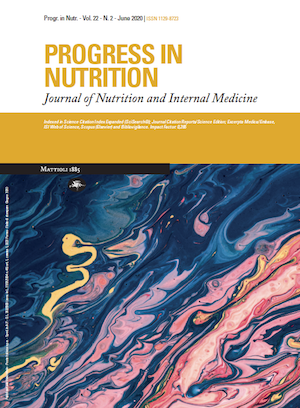Roseburia species in intestinal flora in amateur and professional male football players Roseburia Intestinal Flora football players
Main Article Content
Keywords
Intestinal flora, Roseburia, Exercise, Nutrition, Football
Abstract
Background: Intestinal flora varies throughout life-long by being affected by many factors such as diet, stress, and exercise Purpose: In this study, it was aimed to examine roseburia intestinal flora in amateur and professional male football players. Materials and Methods: A total of 10 male volunteers, aged between 18-21, playing football in the professional league (n=5) and playing football in the amateur league (n=5) participated in the study. A “stool sample” was taken from all subjects and a metagenomic analysis of the Roseburia genus was performed using the IlluminaMiSeq analyzer with the Next-Generation Sequencing method. In addition, a questionnaire was applied to determine participants’ eating and nutrition habits. SPSS 20.0 package program and Minitab 17 software were used in the analysis of the data, the level of significance was taken as p<.05. Results: It was found that amateur footballers have more Roseburia genus than professional ones, and this difference was statistically significant (p<.05). Also, it has been determined that nutrient choices of amateur football players were carbohydrate-based and professional athletes were protein-based. Conclusions: Our findings lead us to think that football trainings’, which are practiced in amateur and professional level, intensity, and quality, content as well as groups different nutrition styles affect Roseburia species.
References
2- Nazlıkul, H. Duygusal beyin: Bağırsak. İstanbul:Destek Yayınları,2018; 15-147.
3- Junger, A. Temiz bağırsak.İstanbul: Pegasus Yayınları, 2018; 30-92.
4- Genç A, Tutkun E, Acar H, Zorba E. Investigation of Relation Between Clostridium Colonization and Nutrient Consumption in Intestinal Flora in Athletes and Sedentary Men. Progr Nutr [Internet]. 2019Apr.4 [cited 2020Feb.2];22(2).
5- Perlmutter, D., and Loberg, K. Beyin ve bağırsak (Birinci Baskı).İstanbul:Pegasus Yayınları, 2017; 15-125.
6- Tamanai-Shacoori Z, Smida I, Bousarghin L, Loreal O, Meuric V, Bing Fong, S,Bonnaure-Mallet M,Jolivet-Gougeon A. Roseburia spp.:a marker of health? Future Microbiol.2017; 12: 157-170.
7- Koçak, T., Şanlıer, N. (2017). Mikrobesin öğeleri ve mikrobiyota etkileşimi. Gümüşhane Üniversitesi Sağlık Bilimleri Dergisi, 6(4), 290-302.
8- Estaki, M., Pither, J., Baumeister, P., Little, J.P., Gill,S.K., Ghosh, S., Vand, Z.A., Marsden, K.T., and Gibson, D.L. Cardiorespiratory fitness as a predictor of intestinal microbial diversity and distinct metagenomic functions. Microbiome, 2016; 4(42), 2-13.
9- Yatsunenko, T., Rey, F.E., Manary, M.J., Trehan, I., Bello, M.G., Contreras, M., Magris, M., Hidalgo, G., Baldassano, R.N., Anokhin, A.P., Heath, A.C., Warner, B., Reeder, J., Kuczynski, J., Caporaso, J.G., Lozupone, A., Lauber, C., Clemente, C.J., Knights, D., Knight, R., and Gordon, J.I.. Human gut microbiome viewed across age and geography. Nature, 2012; 486(7402), 222–227.
10- Sonnenburg, E. D., Smits, S. A., Tikhonov, M., Higginbottom, S. K., Wingreen, N. S., and Sonnenburg, J. L. Diet-induced extinctions in the gut microbiota compound over generations. Nature, 2016; 529(7585), 212.
11- Cerda, B., Perez,M., Pérez-Santiago, J.D., Tornero-Aguilera, J.F., González-Soltero, R., and Larrosa, M. Gut Microbiota Modification: Another Piece in the Puzzle of the Benefits of Physical Exercises in Health? Frontiers in Physiology, 2016; 7(51), 2-11.
12- Cook, M.D., Allen, J.B., Pence, B.D., Walling, M.A., Gaskins, H.R., White,B.A., and Woods, J.A. Exercise and gut immune function: evidence of alterations in colon immune cell homeostasis and microbiome characteristics with exercise training. Immunology& Cell Biology, 2016; 94(2), 158-163.
13-Matsumoto M, Inoue R, Tsukahara T, Ushida K, Chiji H, Matsubara N, Hara H. Voluntary Running Exercise Alters Microbiota Composition and Increases n-Butyrate Concentration in the Rat Cecum, Bioscience, Biotechnology, and Biochemistry, 2008; 72:2, 572-576..
14- Evans, C. C., LePard, K. J., Kwak, J. W., Stancukas, M. C., Laskowski, S., Dougherty, J., Moulton, L., Glawe, A., Wang, Y., Leone, V. Antonopoulos, D. A., Smith, D. Ciancio, E.B.M.J. Exercise prevents weight gain and alters the gut microbiota in a mouse model of high fat diet-induced obesity. PloS one, 2014; 9(3), 92193.
15- Choi, J. J., Eum, S. Y., Rampersaud, E., Daunert, S., Abreu, M. T., and Toborek, M. Exercise attenuates PCB-induced changes in the mouse gut microbiome. Environ Health Perspect, 2013; 121, 725–730.
16- Leclercq, S., Matamoros, S., Cani, P. D., Neyrinck, A. M., Jamar, F., Stärkel, P., Windey, K., Tremaroli, V., Bäckhed, F., Verbeke, K., Timary, P., and Delzenne N.M. Intestinal permeability, gut-bacterial dysbiosis, and behavioral markers of alcohol-dependence severity. Proceedings of the National Academy of Sciences, 2014;111(42), 4485-4493.
17- Codella, R., Luzi, L., and Terruzzi, I. Exercise has the guts: How physical activity may positively modulate gut microbiota in chronic and immune-based diseases. Digestive and Liver Disease, 2017; 1-48.
18- Mayer, E. Beyin-Bağırsak Bağlantısı (Üçüncü Baskı). İstanbul: Paloma Yayınevi, 2017; 24-52.
19- Karl, J.P., Margolis, L.M., Madslien, E.H., Murphy, N.E., Castellani, J.W., Gundersen, Y., Hoke, A.V., Levangie, M.W., Kumar, R., Chakraborty, N., Gautam, A., Hammamieh, R., Martini, S., Montain, S.J., and Pasiakos, S.M. Changes in intestinal microbiota composition and metabolism coincide with increased intestinal permeability in young adults under prolonged physiological stress. American Journal of Physiology-Gastrointestinal and Liver Physiology, 2017; 312(6), 559-571.
20- Filippo, D.C., Cavalieri, D., Paola, M.D., Ramazzotti, M., Poullet, J.B., Massart, S., Collini, S., Pieraccini, G., and Lionetti, P. Impact of diet in shaping gut microbiota revealed by a comparative study in children from Europe and rural Africa. Proceedings of the National Academy of Sciences, 2010; 107(33), 14691-14696.
21-Köse G, Tayfur M, Birincioğlu İ, Dönmez A. Adaptation Study of the Mindful Eating Questionnare (MEQ) into Turkish, Journal of Cognitive-Behavioral Psychotherapy and Research, 2016; 5(3): 125-134.






